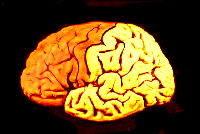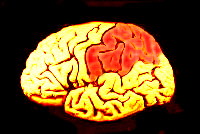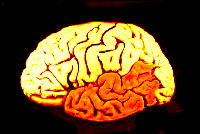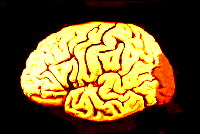
- voluntary movement
- controlling attention
- guide/control social behavior
- judgment
- problem-solving
- decision making
- motivation
- emotional control
- expressive language
- motor integration
COGNITIVE SKILLS AND FUNCTIONS ASSOCIATED WITH THE 4 LOBES OF THE BRAIN
The brain makes our hearts beat, our eyes blink and our skin shiver. It enables us to love, think, reason, forgive, create, and remember. It controls many automatic responses such as breathing, digestion, and motor reflexes. The brain signals our next move.
 |
FRONTAL
LOBE:
|
Links and integrates all components of behavior at the highest level, Emotions and social adjustment and impulse control are also localized here.
Injury to parts of the frontal lobe may cause an inability to move part of the body or the whole side of the body. Speech ,may become halting, disorganized or be stopped except for single explosive words. Personality may change. Social rules of behavior may be disregarded. The executive functions of planning, abstract reasoning, impulse control, sustained attention and insight are all located here. The frontal lobe is highly susceptible to injury.
 |
PARIETAL
LOBE:
|
Is largely responsible for construction ability and language. Injury to the front parts of this lobe may cause someone to lose sensation on parts of the body. With an injury in this area one may become disoriented. Recall of long term memories may be mixed up in time or sequencing. A person may become easily lost or confuse left and right. They may have difficulty recognizing or naming what they see. Injury may also produce disorders in the ability to read, write or perform math calculations. This area also includes conscious sensation and voluntary motion.
 |
TEMPORAL
LOBE:
|
Perceives and recognizes verbal material. It is among the most frequently injured parts of the brain during head injury. A person may have difficulty screening out distractions. Injury to the upper temporal area can cause someone to misunderstand what is said. The person may also make sounds like words which arenít recognizable as words at all. They may also misunderstand body language. Emotional changes such as unexplained panic or unexpected tearfulness may be noted. Left temporal area includes production of speech, naming and verbal memory. The right temporal area includes musical abilities, foreign languages, visual memory and comprehension of the environment.
 |
OCCIPITAL
LOBE:
|
Injury to this area usually results in "blindness" to part or all of the visual field. Usually people experience "holes" or "blind spots" in what they see. There may be problems picking things out of space or they may misperceive pictures or objects. In addition, the recognition of colors may be disturbed.
information from this document came from source: NeuroCare, Inc.